Turning Waste into Wealth: SMEs Pioneering the Circular Economy Revolution
| Date |
Date
|
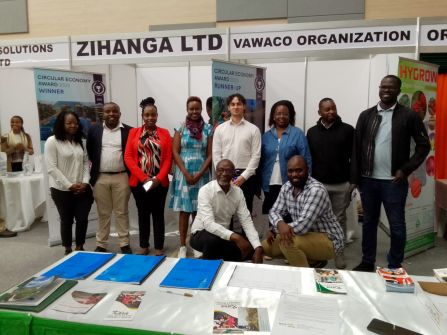
In the heart of Kenya, a quiet revolution is taking place, one that promises to redefine not just the economy but our very relationship with waste. The Circular Economy Catalyst held a session on “Harnessing Resources from Waste: Financing Strategies for SMEs Driving Waste Solutions in the Circular Economy” at the recent LOOP Forum in Kenya, hosted by the Kenya Association of Manufacturers (KAM).
The spotlight of the event was on the Circular Economy, an innovative approach to resource management that's gaining traction worldwide. Circular economy principles are simple yet profound: eliminate waste and pollution, circulate products and materials, and regenerate nature. It's a philosophy that not only addresses pressing environmental issues like climate change and biodiversity loss but also presents an array of economic opportunities.
During the Forum, leaders from both governmental and non-governmental sectors converged to discuss strategies for accelerating the circular transition. Eng. Festus Ng'eno, the Principal Secretary for the State Department of Environment and Climate Change, highlighted Kenya's waste management challenge, with a staggering 8 million tonnes of waste generated annually. This excess waste not only burdens our environment but also represents untapped potential for economic growth.
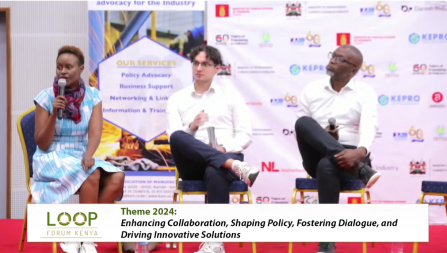
At the heart of this forum was a captivating presentation by Daniel Monje, Consultant at adelphi and Circular Economy Catalyst, who delved into the crucial role of financing strategies for SMEs driving waste solutions in the circular economy, such as grants, loans, equity financing and blended financing.
Monje's keynote presentation was not just an exposition of ideas but a call to action, urging stakeholders to harness resources from waste and invest in innovative financial solutions to unlock growth capital for enterprises adopting circular business models. Through the Circular Economy Catalyst programme, implemented by adelphi and supported by the IKEA Foundation, Monje outlined how more and new financial products are needed to scale circular business models at large, fostering economies that are restorative and regenerative by design.
Structured around incubation and acceleration phases, the Circular Economy Catalyst programme provides early-stage and growth-stage entrepreneurship support, equipping aspiring entrepreneurs with the tools and resources needed to adapt and test circular business models. With over 200 early-stage entrepreneurs trained, including a 57% representation of women, and more than 70 business advisors onboard, the programme is making tangible strides in driving circular innovation.
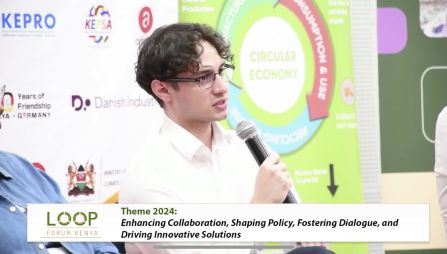
One of the highlights of Monje's presentation was the Circular Economy Taxonomy, which maps out various opportunities for entrepreneurs across different quadrants of the circular economy. With activities ranging from product design and manufacture to post-production and product redesign, entrepreneurs are presented with a myriad of financing needs, ranging from research and development to marketing and infrastructure.
To illustrate the impact of these financing strategies, success stories from Ecorich Solutions Ltd, VAWOCO Organisation, and Zihanga Ltd, three pioneering SMEs driving change at the grassroots level.
Ecorich Solutions Ltd, led by Robinson Irekwa, has revolutionised organic waste management through its innovative wastebot technology. By converting organic waste into organic fertiliser within 24 hours, Ecorich not only minimises environmental impact but also contributes to the creation of a circular and resilient agricultural ecosystem. With support from grants and financing from a SACCO and a grant of 15,000 euros from E4impact – an O-farms circular economy acceleration programme – Ecorich has expanded its operations, opened multiple collection centres, and launched the latest version of its wastebot.
Zihanga Ltd, led by Nicholas Ndekei, is solving the problem of organic waste through using insects to develop organic waste. This solution has enabled the company to contribute towards recycling 500 tons of organic waste and producing over 500 tons of insect protein that has been utilized to improve farmers' livestock yield.
Similarly, VAWOCO Organisation, spearheaded by Catherine Muraya, is tackling the e-waste challenge through its collection and refurbishment service of discarded smartphones. By integrating collecting, sorting, repairing, and reselling of smartphones, VAWOCO promotes resource efficiency and extends the lifespan of electronic devices. Through revenue generation from sales and refurbishment of smartphones, as well as grants and public-private partnerships, VAWOCO is driving both environmental impact and economic opportunity.
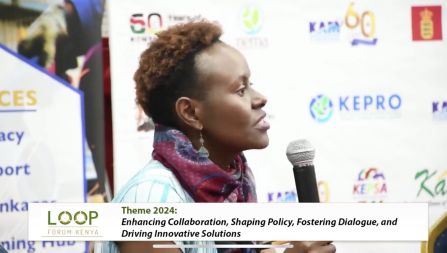
Wairimu Mwangi, a co-founder of Loopworks Venture, reiterated that the showcased SMEs provide examples of SMEs that are poised to scale and grow and as such they require financial institutions to unlock the finances that can assist in that.
As Monje emphasized, these SMEs represent the vanguard of the circular economy revolution, demonstrating that sustainability and profitability are not mutually exclusive. Yet, to unlock the full potential of circular entrepreneurship, innovative financing mechanisms are needed, including grants, loans, equity financing, and public-private partnerships. He highlighted the need for innovative financing strategies to support SMEs driving waste solutions, stating, "We need more types of finance and mechanisms to increase access to finance to cover the enterprise financing needs."
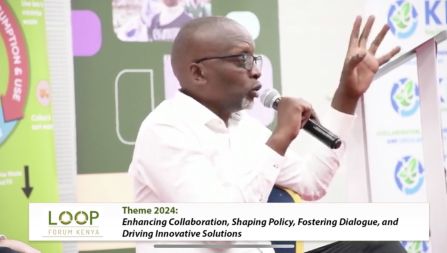
Michael Kalo, co-founder of Loopworks Ventures, emphasized the need for formal financial institutions to develop financial products tailored to SMEs that have embedded circularity in their business model to enhance the provision of green financing to SMEs. These SMEs are not just reducing waste, they're rewriting the narrative around resource management. By harnessing technology, innovation, and community engagement, they're proving that sustainability and profitability can go hand in hand.
But the journey doesn't end with innovative startups. Government policies, public-private partnerships, and financial mechanisms play a crucial role in scaling up circular initiatives. The commitment of governmental bodies and international partners, as highlighted by speakers like the Danish Minister for Environment Magnus Heunicke, is essential for creating an enabling environment for circular businesses to thrive.
As we reflect on the discussions and insights shared at the LOOP Forum, one thing becomes clear: the circular economy is not just a buzzword; it's a blueprint for a more sustainable and prosperous future. By embracing the principles of reduce, reuse, and recycle, and providing them with the technical and financial support needed to scale, we can unlock new opportunities, protect our planet, and build resilient communities.
